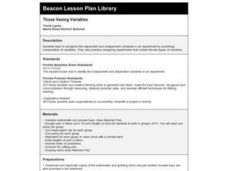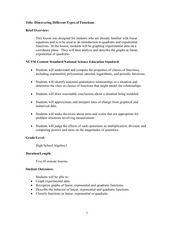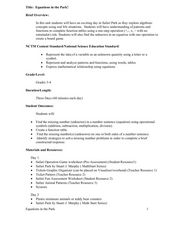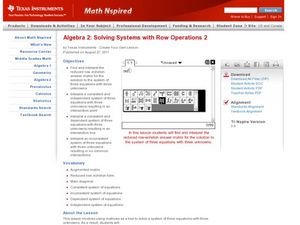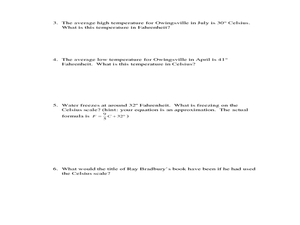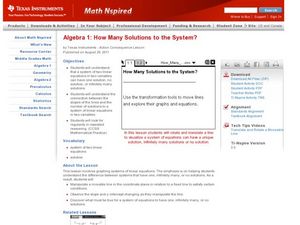Curated OER
Those Vexing Variables
Students recognize dependent and independent variables in an experiment by practicing manipulation of variables; students practice designing experiments that contain the two types of variables.
Curated OER
Linear Inequalities in One and Two Variables: Rays and Half Planes
Define rays and half planes, including the concepts of boundary lines and prerequisite knowledge of coordinate planes. Given linear inequalities in one and two variables, your class will compare the differences. They will also graph...
Captain Planet Foundation
Square Foot Fall Garden
First graders learn the basic needs of plants and identify geometric shapes while planting a fall garden. Combining math and science in one lesson, the resource guides kids through starting their class garden as they...
Alabama Learning Exchange
Color This Polynomial Simplified
Help learners use a variety of methods to identify, visualize, and simplify polynomials with like terms. Several different visuals are used to introduce the instructional activity, such as colored pencils, overheads, interactive white...
Mr. Science
The Scientific Method
First, ask a question and then, do research. Next, form a hypothesis, and conduct an experiment. Make observations, gather and analyze data, and then state a conclusion based on the results. This is the scientific method, and here is a...
Texas Instruments
Variables and Expressions
Learners solve equations by writing expressions. For this algebra lesson, students identify the different values for each variable. They use the navigator to see how to solve equations.
Mr. Waynes clas
Kinematics Objectives
Accelerate young physicists' learning with this collection of problem-solving worksheets. Starting off by teaching students to identify the given information and variables in physics problems, this resource goes on to challenge them...
Curated OER
Discovering Different Types of Functions
Graph polynomials and identify the end behavior of each polynomial function. The class differentiates between linear, quadratic, and other polynomial equations.
Physics Classroom
Case Studies: Impulse and Force
Why are gym walls padded and cars required to have air bags? Scholars observe two similar situations, such as those listed above, with only one variable altered. They identify the different variable and determine how the variation...
Shodor Education Foundation
Algebra Quiz
Reviewing the process of solving equations is as easy as one click of a button. Scholars solve linear and quadratic equations by using a helpful interactive. The computer app automatically scores responses, providing immediate feedback...
Curated OER
Multiplication: Bugs Can Multiply, So Can I!
Develop multiplication skills with your class. Youngsters will visualize multiplication as repeated addition. Then they will create a multiplication bug book and discover arrays as a strategy for multiplication problem solving....
Curated OER
Dirty Decomposers
Learners explore the ecosystem by conducting a ziploc bag experiment. In this recycling lesson, students identify decomposer organisms in our environment and how they speed up the recycling process. Learners utilize a ziploc plastic bag,...
Virginia Department of Education
Predicting Products and Writing Equations
A chemistry lesson presents 14 chemical reactions for scholars to observe, write the equation, and balance the equations. Additionally, it provides ways to extend the activity as it relates to catalysts.
Curated OER
Equations in the Park
Young scholars explore algebraic concepts using real life situations. In this equations lesson, students develop strategies to solve missing number problems. Young scholars participate in a board game based on algebraic equations.
National Security Agency
Equations and Expressions
Learners demonstrate their knowledge pictorially, concretely, and abstractly in this unit meant to last three hours over three days. Using hands-on activities, manipulatives, real-world applications, and problem...
Curated OER
Exploring Expressions
Examine parts of an expression in this algebra lesson. Ninth graders identify the properties of the coefficient and their behavior to the graph. They graph the equation on a TI to see their results.
Curated OER
Your Weight on Other Planets
Students explore their weight on other planets. In this science lesson, students view a presentation about the other planets and complete a worksheet in which they make predictions about their weight on the moon and other planets.
Curated OER
Discovering Ohm's Law
Connect math with science! Pupils apply properties of Ohms Law as they solve problems and identify the inverse relationship of a function. They analyze the shape of the graph of an inverse function and use it to make predictions.
Curated OER
Scientific Method
Students explore the scientific method. In this scientific method activity, students use information gathered from a "Seed Dispersal" lab done previously to complete a worksheet listing the steps of the scientific method.
Curated OER
Batteries in Series: Voltage and Light Intensity
Students participate in a hands-on activity to explore the relationship between the number of batteries in a series circuit and its voltage. Students identify the relationship between two variables and plot points on a graph.
Curated OER
Solving Systems with Row Operations 2
Have your class solve equations using matrices by teaching them how to factor systems of equation to identify the point of intersection. They create their matrices on the Ti and perform row operations to simplify.
Curated OER
Celsius to Fahrenheit
Students convert degrees between two different units. In this algebra lesson, students graph linear equations and identify the line of best fit. They use their line of best fit to make predictions given a set of data.
Curated OER
How Many Solutions to the System?
Solve systems of equation using graphing! In this algebra instructional activity, students use the TI to graph two lines and identify the number of solutions. They perform interactive graphing on the navigator.
Curated OER
Using Tables to Solve Linear Functions
Oh that intercept! Budding algebra masters solve linear equations from standard to intercept form. They identify the slope and y-intercept to help graph the lines, an then create coordinate pairs using a table of values. Great TI tips...
